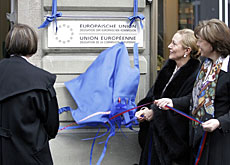
European Union embassy opens for business

The European Union representation in the Swiss capital Bern has officially opened, signalling a normalisation of relations with Brussels say experts.
But the EU’s relationship with Switzerland is overshadowed by a dispute over the Swiss cantonal corporate tax system, which the union says is unfair.
“This day has finally arrived,” said the EU’s external relations commissioner, Benita Ferrero-Waldner, in Bern on Tuesday.
For Swiss Foreign Minister Micheline Calmy-Rey, the opening of a permanent EU office in the capital was important. She added that she hoped it would improve understanding between Bern and Brussels.
Switzerland – which is not a member of the EU – has until now largely maintained a pragmatic approach towards the organisation.
For a long time while membership was not ruled out, the country concluded a series of treaties with Brussels – which included trade, labour and security cooperation.
In 2006 the government made it clear that it would be continuing its purely bilateral stance, putting any idea of accession on hold for the time being. This decision was in line with the views of a majority of the Swiss population, which remains opposed to joining the organisation.
Recent relations have been marred by a spat over corporate tax. The EU maintains that low taxes for holding companies offered by some cantons – which have prompted some firms to move to Switzerland from other European countries – violate a free trade agreement.
Switzerland has denied this. The matter remains unresolved, and Calmy-Rey and Ferrero-Waldner made no headway during discussions earlier in the day.
“Switzerland is not interested in negotiating this issue,” said the Swiss foreign minister. The commissioner said however that the EU was prepared to be patient and that a solution could be found.
Normalisation of relations
For Laurent Goetschel, a political expert at Basel University’s European Institute, the opening of the embassy – close to the Swiss foreign ministry – is a sign of “normalisation” of relations between Bern and Brussels.
“The EU has representatives all over the world and it was an anomaly that Switzerland wasn’t included,” said Goetschel.
The political expert believes that the embassy, headed by the Austrian Michael Reiterer, could simplify the exchange of information between the two sides and heighten the visibility of relations with the EU.
“A diplomatic representation always has an important symbolic role, even if nowadays negotiations between the two do not always only take place through diplomatic channels,” said Goetschel.
There are still many topics up for discussion. Among the most controversial are the tax question and the recent enlargement of the EU to include Bulgaria and Romania.
On the other hand, Switzerland is interested in concluding bilateral agreements on the electricity market and agriculture.
Other subjects for debate are participation in EU research programmes, certificates of origin for foodstuffs and the Galileo navigation system.

More
EU bilateral accords
Welcome EU?
Parliamentarians in favour of the EU in Switzerland have welcomed the opening of the embassy.
“The embassy presence’s could avoid there being a bad perception of EU initiatives,” said the centre-left Social Democrat Roger Nordmann, a committee member of the New European Movement Switzerland.
The organisation’s president, the centre-right Radical Christa Markwalder goes further. “It was time for an EU presentation opened in Bern because it is one of our most important political and economic partners,” she said.
But enthusiasm is tempered in the anti-Europe camp. “We consider the embassy’s opening as a recognition of the fact that Switzerland is not part of the EU,” said Hans Fehr, a rightwing Swiss People’s Party parliamentarian.
But Fehr, who is also director of the Campaign for an Independent and Neutral Switzerland association, warns that the EU should watch its step. “Mr Reiterer should not meddle in our internal affairs and should clearly communicate our position to Brussels,” he added.
swissinfo
Michael Reiterer took up his post at the beginning of the year. He officially represents the European Commission – the EU’s executive body – in Bern.
Fifty-two-year-old Reiterer, who was born in Austria, has served as deputy head of the delegation of the European Commission to Japan for four years.
Since 2005, he has also been a lecturer on international relations at Innsbruck University.
Many hypotheses have been put forward to explain the delay in opening an EU embassy in Bern compared with other countries.
Goetschel says the EU already had a representative in Geneva for the international organisations and was perhaps therefore not in a rush to open an office in Bern.
According to a newspaper interview given by ambassador Reiterer, the delay could also have been because Brussels thought for a long time that Switzerland would eventually join the EU.
Some experts believe that geographical proximity, intense relations built up through the bilateral process, and the presence of a Swiss mission in Brussels may have meant a Bern embassy was not a priority for the commission.

In compliance with the JTI standards
More: SWI swissinfo.ch certified by the Journalism Trust Initiative



























You can find an overview of ongoing debates with our journalists here . Please join us!
If you want to start a conversation about a topic raised in this article or want to report factual errors, email us at english@swissinfo.ch.